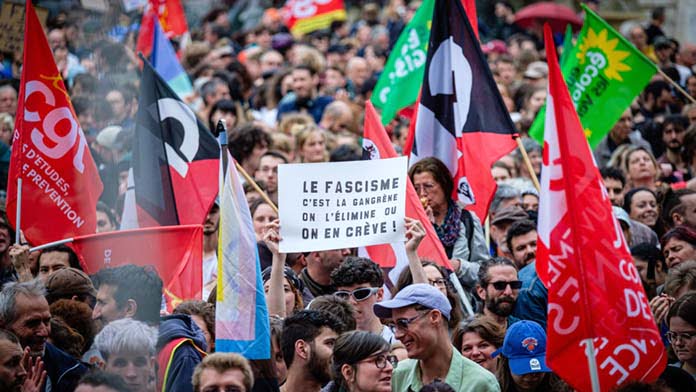Despite the fascists’ failure to take government in France, they will continue rising if the left relies on electoral deals to halt them, argues Cooper Forsyth
Parliamentary elections in France saw a widely anticipated victory for the far right thwarted, with the New Popular Front, an electoral alliance of four left-wing parties, coming out on top with 180 seats.
In second place, President Emmanuel Macron’s neoliberal Ensemble alliance won 168 seats, with the far-right National Rally (RN) third with 143 seats.
The results are a blow to the far right, who were expected to come first following their success in the European parliamentary elections and strong lead in the first round of voting. It shows that most people in France are unwilling to accept a fascist party in government.
The victory belongs to the 800,000 people who took to the streets last month against the RN and then campaigned against them.
The massive voter turnout, up to 67 per cent, compared to 46 per cent for the parliamentary elections in 2022 and 43 per cent in 2017, is a testament to the determination to prevent the RN coming to power.
Macron hoped that the possibility of a far-right government would rally voters to his side. Instead, the French public used the election to vent their anger about cost of living, the genocide in Gaza and repeated attacks by Macron’s government on the working class.
But there can be no complacency about the threat of the far right.
The RN continued its meteoric rise, increasing its vote from 88 to 143 seats. Leader Marine Le Pen declared that victory had only been “delayed”. She recognised that, “The tide is rising. It did not rise high enough this time but it is continuing to rise.”
Without an outright majority, the New Popular Front will have to collaborate with Macron’s party in order to govern.
This will mean more attacks on the working class and concessions to racism and Islamophobia.
The danger is that this allows the RN to continue to present itself as the only alternative to the failing political system.
The rise of the RN
The RN, formerly the National Front, has its roots in the fascist movement and is still run by committed Nazis.
Following the defeat of fascism in the Second World War, and the relative stability of capitalism, the precursors to the National Front argued that for fascism to become relevant again, it would have to distance itself from the legacies of Hitler and Mussolini. Organising armed fascist gangs would not be their immediate path to power as it was in the 1930s.
Instead, a turn towards an electoral front would help fascism break out of its “ghetto” and reach wider layers of support in order to “transform them in our image”, as the fascist organisation Jeune Nation argued.
This approach laid the foundation for the National Front. It modelled its structure on the fascist French Popular Party of the 1930s and 1940s, but focused its platform on immigration rather than racial purity.
It was the rise of Islamophobia and anti-migrant racism, in response to the war on terror after the September 11 Twin Tower attacks, as well as an attempt to gain consent for an unpopular neoliberal economic agenda, that legitimised the National Front’s politics and brought it into the mainstream.
At the same time it maintained links to violent racist thugs and sought to build a fascist core inside the party.
The rise of Islamophobia coincided with a collapse in job security and living standards for working class people.
Islamophobia was the key way successive governments were able to maintain legitimacy, deflecting the blame for economic misery onto immigrants and Muslims.
The FN’s idea of creating harsher punishments for some crimes, when they are committed by foreign or dual nationals, was taken up first by right-wing president Nicholas Sarkozy. This was continued under the Socialist Party presidency of Francois Hollande between 2012 and 2017.
At the time, Le Pen gloated, “When you see … a President of the Republic take up the Front National’s measures, there’s an astonishing aspect to this, an homage to the FN.”
After the 2015 Islamic State terror attacks, Hollande tried to whip up nationalist and Islamophobic sentiment under the guise of “republicanism” and “secularism”, organising a “republican march against terrorism”. This went hand in hand with attacks on the working class.
As France-based socialist Jad Bouharoun put it: “It was in this context, when it appeared as if a police state had suddenly descended upon society and filled the air with a deafening chauvinistic and Islamophobic racket, that Hollande launched his frontal attack against the working class with the ‘El Khomri’ labour law.”
This legacy of the Socialist Party in particular, in both conceding to Islamophobia and implementing attacks on the working class has produced rising support for the RN.
An Ipsos poll shortly before the first round of the elections found a majority (54 per cent) of people who self-identify as “disadvantaged” backed the RN. The far-right party also secured the highest share of the “popular class” vote (38 per cent), three percentage points ahead of the left-wing coalition.
It also found that, “Most voters who said they barely make ends meet or rely on savings and/or loans to get by (41 per cent and 46 per cent respectively) backed the RN ahead of its left-wing rivals.”
Frédéric Micheau, deputy managing director of pollster OpinionWay, explained this as a result of “a feeling of abandonment and betrayal” the left-wing electorate feels towards the Socialist Party.
This should serve as a warning for the resurgent New Popular Front. As part of the NPF, the Socialist Party won 59 seats.
Ironically, the success of the NPF has helped to resuscitate the Socialist Party. But it was the Socialist Party in government which discredited the left and helped to pave the way for the fascists.
Macron in power
Macron’s government bears responsibility for the further rise of the RN. As support for the mainstream left and right parties collapsed, Macron sold himself as “neither right nor left”, claiming to represent something different.
But far from overcoming the inequality between rich and poor, Macron has consistently sided with the rich, pushing through neoliberal reforms and attacking the working class, while at the same time making more and more concessions to the racism of the National Rally.
Macron made his reputation in crushing the Yellow Vest movement that challenged neoliberalism beginning in 2018. He encouraged a violent crackdown on protesters and introduced state laws to prosecute those who filmed the grotesque police violence.
He bypassed parliament to ram through increases to the pension age, in spite of massive national demonstrations and strikes by unions in France, which were met again with a brutal police crackdown.
In 2021, he introduced racist laws such as the “anti-separatist law” which introduced a swathe of attacks on Muslims, including a ban on women under 18 wearing the headscarf in public.
In December last year, he passed an anti-immigration bill which slashes social services and makes it much easier to deport immigrants. Le Pen claimed this as an “ideological victory” for her own anti-immigration platform.
This is the context for the National Rally’s large gains in recent months’ European and parliamentary elections.
Collaboration with the right
Ultimately, electoral efforts will not stop the rise of the RN.
Behind the success in the second round is an agreement between the NPF, including its most left-wing section the France Unbowed party led by Jean-Luc Melenchon, and Macron’s party, where the party that had run third in each seat in the first round of voting stepped down to allow the other a better chance of winning.
But this saw the left give its backing to the very politicians who have paved the way for the RN.
Among those the France Unbowed candidates stood aside for were former prime minister Elisabeth Borne, who repeatedly attacked the conditions of unemployed workers and backed the cops as they brutalised protesters after the police murder of Nahel M a year ago.
Another was interior minister Gerald Darmanin, whose name is associated with the most viscous, racist and Islamophobic laws under Macron. He has even attacked the RN from the right, claiming they are “soft on Islam”.
It is likely the new government will be an alliance between the NPF and Macron’s party. This will discredit the NPF as the left again supports a government forcing through attacks on living standards.
Driving back the fascists requires a movement outside parliament that insists they are not a legitimate party and brands and exposes them as Nazis to undermine their electoral support.
And their attempts to hold meetings, campaign in local shopping areas or hold rallies need to be confronted.
Anti-fascist movements in Greece and Britain that used these tactics have been able to defeat fascist parties such as the British National Front, the British National Party and Golden Dawn in Greece.
Alongside this a mass anti-racist movement is needed to defend migrants, end police violence and demand the repeal of Islamophobic and anti-migrant laws.
Even the NPF has failed to make fighting racism a priority, since sections of it support racism. The Communist Party leader Fabien Roussel, for instance, has said that France’s borders are “sieves” and demanded more police at the borders.
The unions also have a responsibility to wage a more serious fight against attacks on workers’ wages and living conditions and, crucially, to combat the racism that is used to divide the working class.
The union leaders gave up the fight over raising the pension age last year far too easily. A union movement winning clear victories would show that class struggle can improve workers’ lives—as an alternative to racism and voting for the RN.
But, as French socialist Denis Godard has put it, “The situation is far from hopeless. The fascist gangs are growing, but they can’t put tens of thousands on the streets. The left and the unions can put hundreds of thousands on the streets and could mobilise millions.”
The urgent task of the left is to build this fight.






